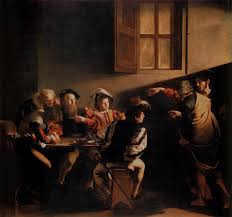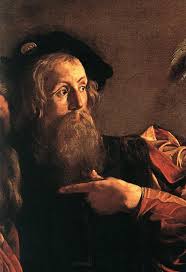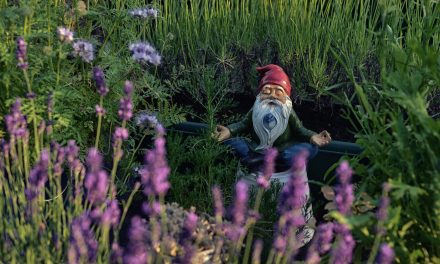*This post is the first in a series of posts on catholicmoraltheology.com reflecting on the interview “A Big Heart Open to God” with Pope Francis published in America Magazine and simultaneously in 15 other Jesuit Magazines around the world
I often visited the Church of St. Louis of France, and I went there to contemplate the painting of ‘The Calling of St. Matthew,’ by Caravaggio.
“That finger of Jesus, pointing at Matthew. That’s me. I feel like him. Like Matthew.” Here the pope becomes determined, as if he had finally found the image he was looking for: “It is the gesture of Matthew that strikes me: he holds on to his money as if to say, ‘No, not me! No, this money is mine.’ Here, this is me, a sinner on whom the Lord has turned his gaze. And this is what I said when they asked me if I would accept my election as pontiff.” Then the pope whispers in Latin: “I am a sinner, but I trust in the infinite mercy and patience of our Lord Jesus Christ, and I accept in a spirit of penance.”

Nestled off of Piazza Navonna and not very far from the Pantheon, San Luigi dei Francesi is one of my favorite places in Rome. For me, it is quintessential Rome. An unassuming facade hides within it a series of artistic masterpieces that draw you in, entrance, inspire and challenge. Caravaggio is a master of light and dark and in the The Calling of St Matthew he uses both to perfection. Who Me?? a perplexed and disbelieving Matthew points to the guy next to him. Every time I visit Rome I visit these paintings and every time it challenges me to ask myself – am I listening? Would I, like Matthew, point to the person next to me?
Who Is Jorge Mario Bergoglio? He feels like Matthew – and like Matthew, he humbly answer’s God’s call.
“I am a sinner, but I trust in the infinite mercy and patience of our Lord Jesus Christ, and I accept in a spirit of penance.”
What struck me about Pope Francis’ answer isn’t just his humility and simplicity but what appears like radical self-awareness. Throughout the interview, we see a man who is able to admit his failings, his own personal development, and his radical dependence upon God. More than that, Pope Francis invites us, challenges us into this deep self reflection. Surveying his public speeches, I’m beginning to notices some interesting patterns – in addition to a favorite painting, he appears to have some key biblical passages he favors – the story of Cain and Abel and the Parable of the Good Samaritan. In both, revelation holds up a mirror and forces self-reflection.
Where is your brother? Am I my brother’s keeper? Perhaps one of the most quoted passages in popular culture, it is almost always invoked such that we place ourselves in Cain’s position – trying to abdicate our responsibility for others. It is a story that plays out over and over again but in Genesis the revealed truth is the opposite. Yes, we are responsible for our brothers and sisters – but do we respond to God and our neighbor? Or do we point to the other guy sitting next to us?
Similarly, in the Parable of the Good Samaritan is deeply self-reflective. The priest and the Levite, both active religious men who would assume they are both listening and responding to God’s call, God’s laws walk past the victim lying on the side of the road. It is the Samaritan, the one who the priest and Levite would not admit as an equal, who stops, shows compassion, and cares for the concrete needs of the broken victim.
Through his words and actions, Pope Francis offers a serious invitation to self-reflection – and he asks this of both individuals and the Church.
Where am I in these stories? Where are we? Do we say yes – or do we point to the person next to us?
Do we create community or do we abdicate our responsibility as our sisters keeper?
Do we tend to the needs of the broken, the victims, the sick, the marginalized? Or do we cross the street to avoid their very sight?
We are all in need of God’s mercy. We are all sinners. But,we can respond to God’s call – even when it terrifies us and we know our own shortcomings. Moreover, like Matthew, conversion is possible. But true self-reflection and admitting mistakes is difficult. Matthew had to reject money and follow Jesus. Francis tells us he had to realize his own failings in leadership when he was a young provincial.
Going back to the interview again, it is still Caravaggio and this line which strike me as providing both the most insight into the man and the challenge in front of all Christians.
“I am a sinner, but I trust in the infinite mercy and patience of our Lord Jesus Christ, and I accept in a spirit of penance.”




Trackbacks/Pingbacks